| autofill |
 |
This is a simple sample program that measures the performance of painting out the screen. The screen is painted out with polygons of different size and aspect ratio, and the speed of this process is measured automatically. The measurement data can be viewed using "gnuplot." For details see "autofill" sample program README file. |
| blockmonkey |
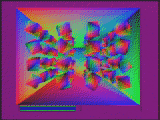 |
A simple application to measure performance. The user can change the display list size and parameters and check the effect at the time of rendering. Instructions for operating the Controller are displayed on the host screen when the application is executed. The performance meter at the bottom of the screen displays the time required for polygon rendering. The CPU processing time required to create the display list is not calculated. This is so the animation will not slow down, even when the next frame is not completed in time. |
| bumpmap |
 |
A sample program of bump mapping. For details, see the README file in the bumpmap sample program. |
| chrome |
 |
A sample program for the reflection mapping function. |
| ci8fb |
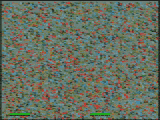 |
A sample program similar to "autofill," but using an 8bit color index for rendering. For details, see the README file in the ci8fb sample program. |
| detail |
 |
This sample program explains how to use multi-tile textures. The demo includes both detail textures and MIP map textures. |
| ddspgame |
|
This sample is an example of hdd.h, which is an upper module of leo.h. |
| eeptest |
 |
A simple program to test EEPROM (4k or 16k). |
| fogworld |
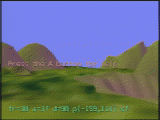 |
This sample program shows how to use the fog process and the volume culling process. |
| gbpak |
|
This is a sample program for N64 GB Pak. |
| ground |
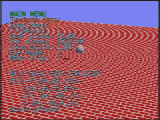 |
A sample program for accurately clipping a large ground plane. |
| gs2dex |
 |
This sample program explains how to use the S2DEX sprite microcode. You need "perl" to compile this program. Please install the below package from the IRIX CD.
eoe2.sw.gifts_perl (for IRIX5.3)/eoe.sw.gifts_perl (for IRIX6.X)
|
| lights |
 |
Shadows and specular highlight effects using RSP textures are rendered, then their position and size are controlled using inputs from the Controller. The background is rendered with MIP mapping. |
| mipmap |
 |
Demonstrates MIP mapping. You can compare this with other texture processes, and check what happens when the MIP map parameters are changed. |
| morphcube |
 |
Uses the CPU to calculate the morphing of each vertex. The CPU and the graphics pipeline execute two consecutive frames in parallel. Large MIP map textures are tiled so they can be accommodated in texture memory. |
| morphfaces |
 |
Morphs a two-dimensional image. The CPU performs vertex morphing, and blending is performed in 2-cycle mode. For details, see the NOTES file in the "morphfaces" sample program. |
| motortest |
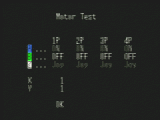 |
A sample program for the Rumble Pak. |
| nosPak |
 |
A sample program for the Controller Pak menu using N64 font data. |
onetri
onetri-fpal |
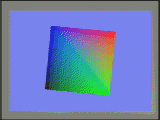 |
A simple sample program for rendering 1 polygon without Z buffer processing. You can perform simple texture mapping by executing with "gload -a -t". |
| overlay |
 |
This sample program performs an overlay of the "onetri" code. (Two different segments, including code and data, share the same region in memory.) |
| pfs |
 |
A sample program for the Controller Pak that lets you experiment with checking, creating and deleting game notes. The control operations are as follows:
C-UP...Check file system C-DOWN...Delete game note
C-LEFT...Create game note C-RIGHT... Format Controller Pak
A...Game note read test B...Game note write test START...Re-read and display.
Note that this differs from the Controller Pak menu that comes with the application. For Controller Pak menu, see the nosPak sample program. |
| playseq |
 |
A sample program using the sequence player. |
| playseq.naudio |
|
This is the sample program playseq, modified to correspond to n_audio. |
| polyline |
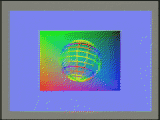 |
Switches between polygon and line microcode for rendering. |
| reboot |
|
This is the sample program to re-boot the sequence. |
| soundmonkey |
 |
A sample program using both the sequence player and the sound player. |
| spgame |
 |
A sample program which renders objects in the foreground and the background using sprite functions. |
| spritemonkey |
 |
A sample program demonstrating use of the Sprite2D sprite microcode. |
| spritemonkeyEX |
|
This sample program uses the sprite microcode S2DEX2. |
| sramtest |
|
Tests whether 256K SRAM is operating. The execution result is returned to the terminal with osSyncPrintf(). Execution requires the 256K SRAM board. |
| terrain |
 |
A sample program for creating geographical features. The geometry is rendered using the N64 hardware, and the interface is manipulated using the Controller. Using this tool you can create data and save it to an INDY disk. It includes Host I/O and demonstrates a number of high-level functions. For details, see the README file in the "terrain" sample program. |
| texlight |
 |
A sample program that expresses a diffuse lighting process, a specular highlight process, and an object which is texture mapped all at the same time. |
| tile_rect2d |
 |
A program which demonstrates in a simple way how to divide a large texture into small texture tiles held in texture memory. Two-dimensional texture rectangle primitives are created. |
| tile_rect3d |
 |
A sample program which explains how to divide a large texture into small texture tiles held in texture memory. The appropriate filtering processes are performed so no joints are created. Triangles are created. |
| threadmonkey |
|
This sample program demonstrates how to use the thread profiler. |
| topgun |
 |
The fighter plane in this sample program is .flt format data modeled with Multigen. In this sample, a display list is created with the accompanying geometry converter flt2c. |
| tron |
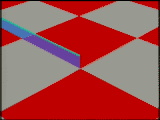 |
The wall is a transparent object that has not been subjected to the sorting process. This sample demonstrates how to avoid a hung RDP by using the BOWTIE_VAL parameter. |
| voice |
|
This sample program is for executing the voice recognition process which uses the Voice Recognition System library functions. |




























